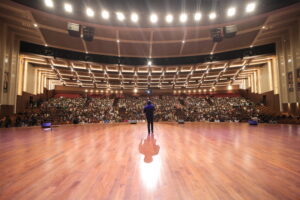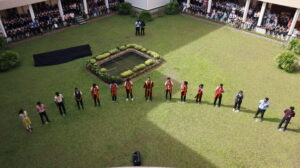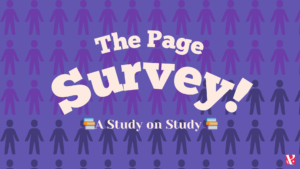The NDLI book fair had an admirable amount of literary treasures for a college book fair. At any technical or arts fest, we are always drawn to the book fair and stay there for enough time to make any spectator wonder why we didn’t just spend the day at a library instead. Here’s some of our favourites.
Aparna’s Pick :The Picture of Dorian Gray, Oscar Wilde
At the heart of the Rajagiri Book Fair, among stacks of forgotten classics and modern bestsellers, I found a book that seemed to call out to me—The Picture of Dorian Gray by Oscar Wilde. Its worn pages and timeless allure made it a relic that I must have.
What followed was a journey into a world where beauty is worshipped, morality is tested, and the consequences of unchecked indulgence unravel most chillingly. Wilde’s prose is as sharp as it is poetic, drawing me into the protagonist’s descent with an eloquence that only he could muster. The novel isn’t just a story; it’s a looking glass, reflecting our own desires, fears, and the price of vanity.
Reading Dorian Gray felt like uncovering a hidden truth, one that lingers long after the book is closed. If you ever chance upon this masterpiece, don’t let it slip away—it’s a story that, much like its protagonist, refuses to fade with time.
Arundhati’s Pick : Men Without Women, Haruki Murakami
Men Without Women by Haruki Murakami. The name, borrowed from Ernest Hemingway’s eponymous 1927 short story collection, carries an air of loneliness, and Murakami masterfully explores this theme in his own way.
Each story in the collection is a quiet, melancholic meditation on solitude, longing, and the unspoken emotions that define human relationships. Murakami’s signature blend of surrealism and deep introspection makes these tales linger in the mind, much like echoes of conversations left unfinished. His characters, often ordinary men grappling with the absence of love, seem to exist in a world both familiar and dreamlike.
Reading Men Without Women felt like stepping into a hazy, jazz-filled evening—melancholic yet oddly comforting. It’s a book that doesn’t just tell stories; it makes you feel their weight. If you ever chance upon it, take it home. Some books are meant to be read in solitude, just as they were written.
Adwaitha’s Pick : Catcher in the Rye, J D Salinger
Adulthood—It’s a step that everyone takes at a point in our lives. Some fear it, some anticipate it—but in the end, we all have to face it. The Catcher in the Rye follows our main character Holden Caulfield and his teenage journey filled with mishaps and problems.
The fear of growing up stings hard with this book. The primal urge to hold back what little innocence and childlike tenderness you have in you while still wanting to be tough enough to not let the outside world hurt you again is a never-ending cycle that a lot of teenagers, like Holden, go through. The goodbyes, the what-ifs, and the am-I-even-on-the-right-path questions plague every teenager’s mind as they slowly but surely figure their way around life.
The name itself illustrates how Holden wants to be the catcher by the cliff, saving kids when they fall off said cliff—a well-deluded metaphor for adulthood. He strives to preserve the innocence and naivety of a child, especially of his little sister Phoebe, but accepts that there’s only so much he can protect.
For all those anxious souls standing at the edge of the cliff, scared to enter adulthood—this book is for you. There is no ending point, and there was never really a starting point, but just being with Holden and seeing his monochromatic grief stain his colorful world can make you feel seen.
Ashish’s Pick: Sophie’s World, Jostein Gaarder
In the sea of treasures, and let’s admit, a significant amount of trash too, my eyes fell upon the very intriguing “Sophie’s World” by Jostein Gaarder.
Now I wouldn’t say I randomly stumbled upon this book. I was recommended this book by my teacher when she saw my interest in philosophy. Although my interest in philosophy was soon smothered by organic chemistry and matrix algebra, Sophie’s World revives it for at least a few weeks every time I pick it up. Even though the book is dense with philosophical theories, it throws them at you in bite-sized chunks through the life of Sophie Amundsen, a 14-year-old who lives in Lillesand, Norway.
Through Sophie’s life, Jostein Gaarder reveals himself as both a philosopher and a professor of philosophy. Starting off as a seemingly ordinary story, Gaarder takes us through the world of philosophy along with Sophie. Through her mysterious professor, Alberto Knox, Sophie learns about thinkers like Plato, Aristotle, Descartes, Kant, and Nietzsche. But rather than just introducing the world of philosophy, Gaarder immerses you in it, soon plunging you into it in a manner that can be likened to the movie Inception.
Layer by layer, Gaarder leaves you questioning your own reality, making you feel like you’re not merely a reader but a part of the book’s narrative.
Krish’s Pick : Crime and Punishment, Fyodor Dostoevsky
There are books that educate, some that amuse, and those that make you feel completely upended. One of these books is Crime and Punishment. Holding it again made me remember why Dostoyevsky is a hero of mine, even though I had read it a long time ago before discovering a lovely worn edition at the Rajagiri book market.
The chaos of the human psyche has rarely been more vividly depicted in a novel. Every aspect of Raskolnikov’s journey, his moral quandaries, and the oppressive ambiance of St. Petersburg in the 19th century bears witness to Dostoyevsky’s brilliance. He takes you into the depths of remorse, atonement, and intellectual turmoil rather than merely telling a story.
It is among the most significant works of literature in human history, in my opinion. It is a mirror reflecting the darkest recesses of our conscience, not just a psychological thriller or a morality debate. Reading Crime and Punishment is akin to grappling with oneself, challenging one’s own convictions, and coming out on the other side transformed.
Finding these masterpieces at the book fair served as a reminder of the power of great literature—the type that stays with you long after you’ve finished reading it—rather than a chance to learn something new.






